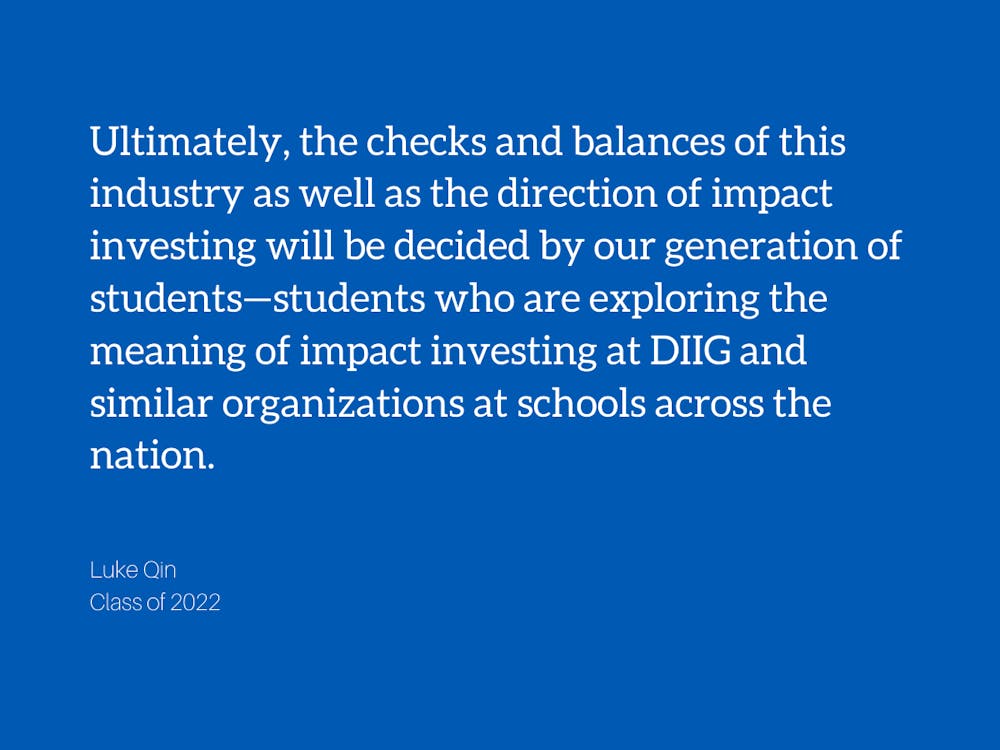Across Duke, the term “impact” has been used so many times to self-characterize one’s long term goals that it can feel trite. Thus, I wasn’t particularly astounded when I read a recent Chronicle column criticizing impact investing not only as superficial but even harmful, funded by unethical capital sources and used by the rich to deflect accountability.
This is an important conversation to have, one that has been heavily discussed within the Duke Impact Investing Group (DIIG), so I’d like to thank Gino for bringing this to the public light. However, impact investing is not just some mechanism for the rich to hide their sins, but rather a field with enormous potential for good despite the risks that it must be held accountable for.
Impact Investing
Though it is true that sometimes, the capital used to make investments has been unjustly acquired, it would be a mistake to generalize these instances of bad actors to the entire field of impact investing. In reality, many impact investors are government funds, foundations, or pension funds. A quarter of impact investment assets under management are owned by government-backed development finance institutions (DFI) that specifically invest money into economic development projects.
These are impact investment funds that are composed of tax dollars and public donations, not by financial gains from fossil fuel companies or weapons manufacturers. The effect of these government projects has already been felt, with domestic DFI impact funds creating 1.5 million jobs and rehabilitating 2.1 million housing units for low income Americans. Rather than perpetuating inequality, impact investing can empower marginalized voices in a time when economic disparity is at an all-time high.
These positive effects are true not only on a domestic level but also on a global scale. For just one example, look towards the energy crisis in developing countries. The energy demand of developing nations is expected to increase by 45% in the next two decades. Fortunately, Actis—an emerging markets fund—is helping these nations diversify their energy consumption into sustainable sources. In 2015, Actis created a $1.9 billion dollar clean energy fund that currently provides enough solar and wind power across Africa for nearly one million homes, homes that now belong to people that lived for years without proper electricity. On a broader scope, half of all impact investments are in developing nations, demonstrating that it has the potential to level the playing field not just between people, but across entire continents.
Despite this, many rightfully still worry about accountability in the field. If impact investing is shaped by the rich and powerful, then what’s to stop it from becoming just another glorified PR scheme? Governments and NGOs have already realized this potential for moral hazard andhave taken action: 45 countries have adopted public frameworks for impact investing and 20 have created legal definitions for “social enterprise.” These numbers will only grow as impact investing proliferates, ensuring that the future is shaped not just by corporations, but by a diverse array of perspectives from public servants to non-profit leaders.
In addition to increased regulatory frameworks, certain impact investors are already putting impact above everything else. While some prioritize above-market returns, many funds are “impact first.” This means that they explicitly target below market returns in order to focus on the most socially beneficial companies. A survey of 266 impact investors that collectively manage $239 billion reported that 34% of respondents are impact first companies that prioritize their investments into socially impactful companies. This means that many funds do not simply treat social impact as a label to be slapped on after a financial return is made; rather, it is considered to be more important than profit.
The Duke Impact Investing Group
DIIG has always been more than just an investment fund. Duke didn’t just throw $100,000 at us as a haphazard redress for moral grievances. In reality, the funding came after two years of designing and teaching house courses for students wanting to learn more about the impact space. Through this educational program, our various divisions have empowered entrepreneurs looking to serve underrepresented minorities and explicitly advocated an alternative route away from traditional pre-professional roles.
With the funding we have been given, DIIG is already making an impact. Our investment clients range from startups that provide affordable STEM education to low income school districts or ones that create insurance-covered clothing for chronically ill patients.
On the client advisory side, our members have had the opportunity to work with startups that focus on more than just the bottom-line. In fact, we’ve gotten over 60 students involved each semester with the Durham community, helping startups that create sustained impact—from improving access to supplies in refugee camps to moving our city towards a no-waste future. DIIG and impact investing as a whole have provided an interface for students to have tangible benefits on the local community while also demonstrating that there exist more than just a handful of career paths to take.
On a broader scope, impact investing is indeed an emerging field, one in rapid need of definition, but when done with the proper accountability, it is not an empty label that thrives off or perpetuates inequality. Rather, it’s a systematized framework developed and encouraged by the United Nations, global NGOs, foundations and government institutions in addition to wealth managers, banks, and pension funds.
Ultimately, the checks and balances of this industry as well as the direction of impact investing will be decided by our generation of students—students who are exploring the meaning of impact investing at DIIG and similar organizations at schools across the nation.
Luke Qin is a Trinity sophomore and the Director of Research for DIIG.
Get The Chronicle straight to your inbox
Signup for our weekly newsletter. Cancel at any time.

